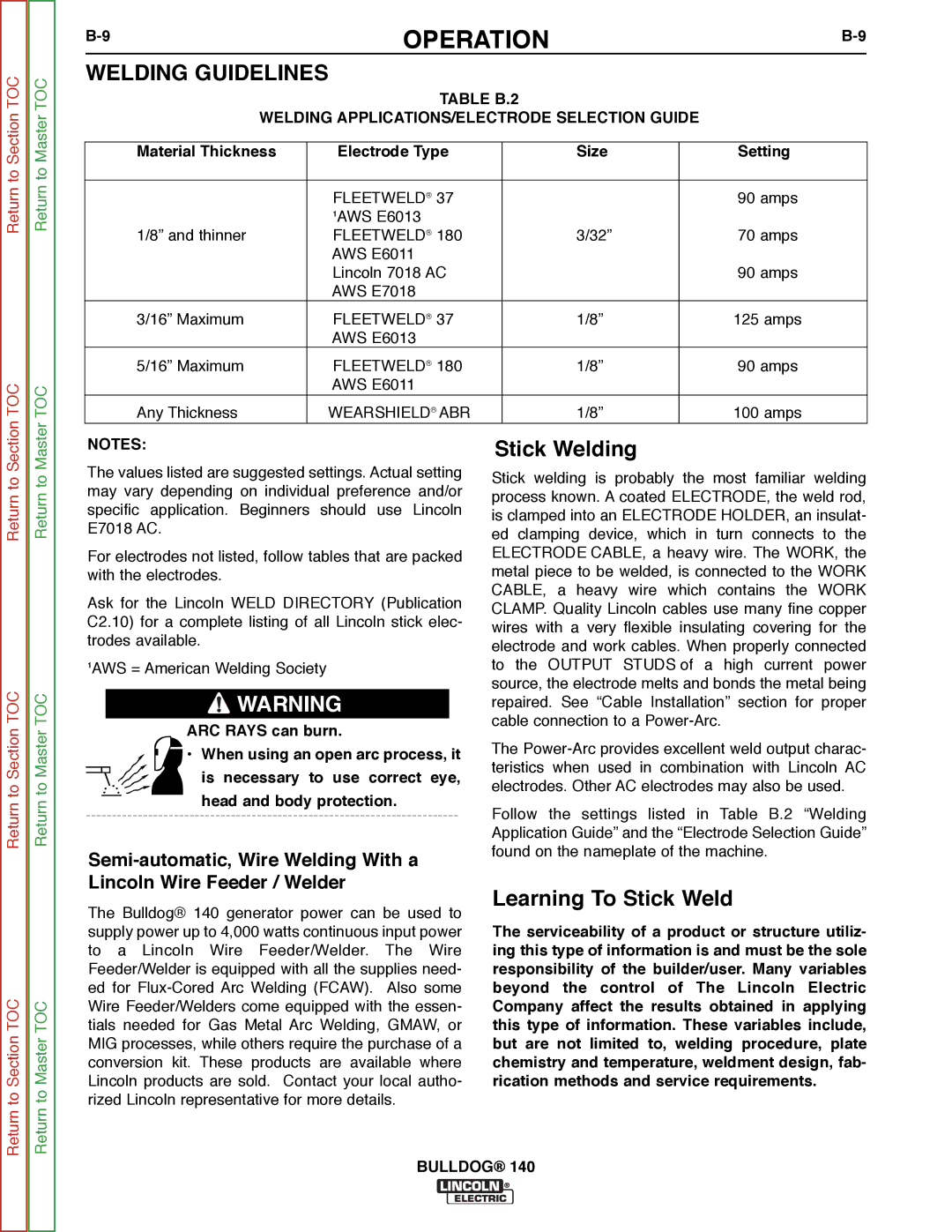
Return to Section TOC
TOC
Return to Master TOC
TOC
OPERATION | ||
|
WELDING GUIDELINES
TABLE B.2
WELDING APPLICATIONS/ELECTRODE SELECTION GUIDE
Material Thickness | Electrode Type | Size | Setting |
|
|
|
|
| FLEETWELD® 37 |
| 90 amps |
| 1AWS E6013 |
|
|
1/8” and thinner | FLEETWELD® 180 | 3/32” | 70 amps |
| AWS E6011 |
|
|
| Lincoln 7018 AC |
| 90 amps |
| AWS E7018 |
|
|
3/16” Maximum | FLEETWELD® 37 | 1/8” | 125 amps |
| AWS E6013 |
|
|
5/16” Maximum | FLEETWELD® 180 | 1/8” | 90 amps |
| AWS E6011 |
|
|
Any Thickness | WEARSHIELD® ABR | 1/8” | 100 amps |
Return to Section
Return to Section TOC
Return to Section TOC
Return to Master
Return to Master TOC
Return to Master TOC
NOTES:
The values listed are suggested settings. Actual setting may vary depending on individual preference and/or specific application. Beginners should use Lincoln E7018 AC.
For electrodes not listed, follow tables that are packed with the electrodes.
Ask for the Lincoln WELD DIRECTORY (Publication C2.10) for a complete listing of all Lincoln stick elec- trodes available.
1AWS = American Welding Society
![]() WARNING
WARNING
ARC RAYS can burn.
• When using an open arc process, it is necessary to use correct eye, head and body protection.
The Bulldog® 140 generator power can be used to supply power up to 4,000 watts continuous input power to a Lincoln Wire Feeder/Welder. The Wire Feeder/Welder is equipped with all the supplies need- ed for
Stick Welding
Stick welding is probably the most familiar welding process known. A coated ELECTRODE, the weld rod, is clamped into an ELECTRODE HOLDER, an insulat- ed clamping device, which in turn connects to the ELECTRODE CABLE, a heavy wire. The WORK, the metal piece to be welded, is connected to the WORK CABLE, a heavy wire which contains the WORK CLAMP. Quality Lincoln cables use many fine copper wires with a very flexible insulating covering for the electrode and work cables. When properly connected to the OUTPUT STUDS of a high current power source, the electrode melts and bonds the metal being repaired. See “Cable Installation” section for proper cable connection to a
The
Follow the settings listed in Table B.2 “Welding Application Guide” and the “Electrode Selection Guide” found on the nameplate of the machine.
Learning To Stick Weld
The serviceability of a product or structure utiliz- ing this type of information is and must be the sole responsibility of the builder/user. Many variables beyond the control of The Lincoln Electric Company affect the results obtained in applying this type of information. These variables include, but are not limited to, welding procedure, plate chemistry and temperature, weldment design, fab- rication methods and service requirements.
BULLDOG® 140
